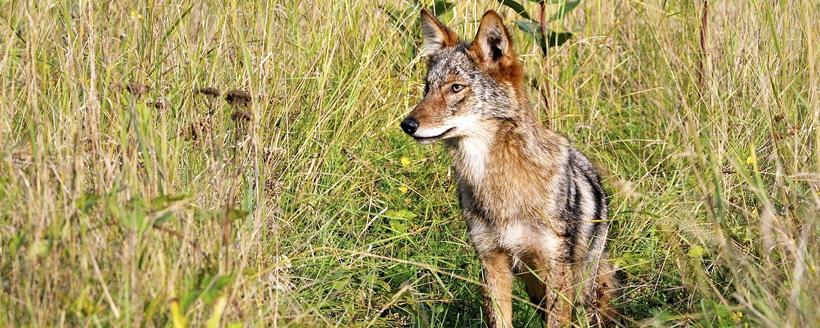The presence of a coyote alone is not cause for concern, as coyotes are naturally afraid of people. Coyotes that spend a lot of time around people or regularly feed on human-associated food can become habituated and exhibit bold behavior toward people. A habituated coyote:
- Does not run off when harassed or chased.
- Approaches pets on a leash.
- Approaches and follows people.
There are a few simple steps people can take to prevent the habituation of coyotes: Remove food sources, protect pets, haze coyotes, and eliminate shelter.
Remove food sources
Feeding, whether direct or indirect, can cause coyotes to act tame and may lead to bold behavior. Coyotes that rely on natural foods remain wary of humans. Never intentionally provide food for coyotes to attract them to your property.
- Remove bird feeders. Bird feeders attract many small mammals, like squirrels, that coyotes prey upon. Coyotes may also consume bird seed and suet. Remove bird feeders to avoid attracting coyotes.
- Secure your garbage and compost. Coyotes raid open trash and compost piles. Secure your garbage in tough plastic containers with tight fitting lids and keep them in secure buildings when possible. Take your out trash the morning pick up is scheduled, not the previous night. Keep compost in secure, vented containers.
-
Protect produce and livestock. Clear fallen fruit from around fruit trees and ripe vegetables from garden. Use fencing to protect livestock from coyotes. Fencing should be at least 6 feet high and extend into the ground. You may also install PVC pipe that is free to spin around a tight wire at the top of the fence or have an outward overhang of fence wire to make it more difficult for the coyote to grip and get over the fence.
-
Feed pets indoors. Outdoor feeding can attract many wild animals.
Protect your pets
While unfortunate, it’s normal behavior for coyotes to attack pets like outdoor cats and unsupervised dogs. Coyotes can view cats and small dogs as potential food sources and large dogs as competition. It's your presence next to your pet that prevents an attack. Do not supervise your pets from a distance. Pets should be on a leash under direct supervision at all times when outdoors. Also remember to feed your pets indoors to avoid attracting wildlife.
Haze coyotes
To prevent habituation, people should aggressively haze coyotes. Hazing is a technique used to deter an animal from an area or change its behavior. Repeated hazing helps teach coyotes to avoid people and that they are not welcome in your neighborhood. Similar to one coyote chasing another out of their territory, you are defining and defending your territory.
You can haze a coyote by:
- Moving toward the coyote while waving your arms or clapping.
- Making loud noises by yelling, using an air horn, or whistle.
- Spraying a hose or throwing small objects, like tennis balls, in the coyote's direction.
Eliminate shelter
- Close off crawl spaces. Coyotes will use areas under porches and sheds for resting and raising young. Close these areas off to prevent animals from using them.
- Cut back brushy edges. Be sure to keep brushy edges in your yard trimmed, as these areas provide cover for coyotes and their prey.
Human health and safety
If an immediate threat to human safety exists, MassWildlife, Animal Control Officers, police departments, and the Environmental Police have the authority to respond to and dispatch the animal as stipulated in the Code of Massachusetts Regulations (CMR) 2.14 that pertain to handling problem animals. This includes animals exhibiting clear signs of rabies. If possible, MassWildlife should first be contacted to authorize the lethal taking of a coyote.
Learn about coyote biology and behavior
Video: Coyote Biology, Management, & Coexistence - Dave Wattles, PhD, Black Bear and Furbearer Biologist
Skip this video Coyote Biology, Management, & Coexistence - Dave Wattles, PhD, Black Bear and Furbearer Biologist.Additional Resources
- Learn about coyotes
- Frequently asked questions about coyotes
- How to effectively haze coyotes
-
Open PDF file, 927 KB, Living with coyotes fact sheet (English, PDF 927 KB)
-
Open PDF file, 3.73 MB, Living with the Eastern Coyote (Massachusetts Wildlife Magazine) (English, PDF 3.73 MB)
-
Open PDF file, 237.54 KB, Understanding coyotes: Advice for parents, schools, daycares (English, PDF 237.54 KB)
